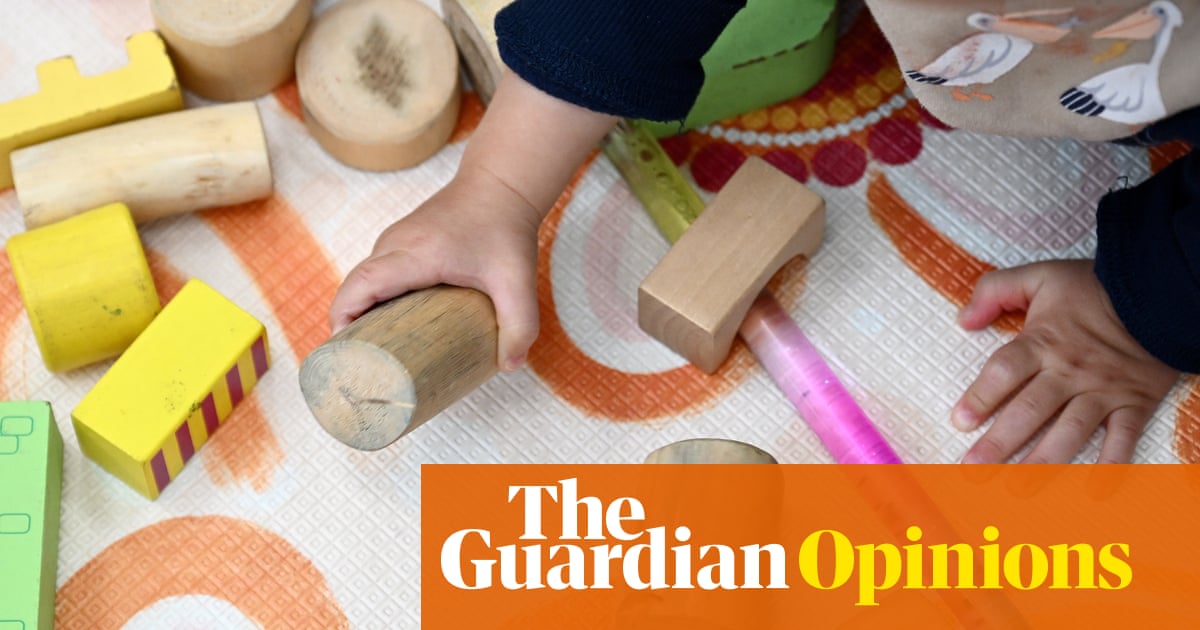Child health clinics, breastfeeding support, groups for new parents, sleep and weaning workshops, speech and language therapy, drop-in physio sessions, parenting courses in child development and mental health, stay and play sessions (including specifically for dads and male carers), music therapy classes, support groups for women and children who have suffered domestic violence, a housing clinic, groups for children with Send and cookery courses.
These are just some of the services available to parents in the borough where I live: Islington, in north London. They exist under the banner of Bright Start, a clever – and I suspect slightly sneaky – rebranding of Sure Start. Sure Start was the Blair government’s leading early years policy, offering area-based holistic support to families with children under five in England (it was Flying Start in Wales and Best Start in Scotland). But since 2010, as a direct result of Tory austerity, 1,416 Sure Start centres in Englandhave closed. Now that the child poverty taskforce is to recommend to the Labour government areturn of the scheme, I thought that it was worth examining what it’s like to live in an area that kept it.
I didn’t realise that Islington had retained Sure Start until I took my baby to be weighed at the local children’s centre after the necessity for home visits ceased. There it was, next to the reception desk: a sign reading “Sure Start”, evidence of what had once been a dedicated service for families not just here, but throughout England. Children’s centres offered all kinds of services like the ones listed above, and they also provided childcare to working parents, those in need and those entitled to the free government hours. In Islington, they still do. Of the three closest to where I live, two are rated “outstanding” and one is “good”.
Childcare is in high demand in Islington, and childcare places aren’t allocated on the basis of a waiting list but on a complex calculation based on proximity, the age balance of the existing children in the room and staffing ratios. Priority childcare places exist for those who need them most: looked-after children, children whose families are homeless, children whose parents suffer from mental health problems, children with disabilities and other vulnerable groups. Health visitors and other professionals can refer these children to a panel for consideration. It’s one way in which the Bright Start services fulfil their remit of helping the most vulnerable families in the borough, an ethos that underpinned the very reason for Sure Start’s existence.
I owe so much of my experience of early parenthood to Bright Start. As someone whose family does not live close, feeling part of a community has been vital to my wellbeing and to my son’s. Like many others, we do not own our flat and we live in an area where we are increasingly surrounded by millionaires (Islington has lots of very rich people in it, but also shocking levels of child poverty). That feeling of community becomes even more important in such a divided borough. Just knowing that there are people there who can help when things get tough means so much. In the three years since I had my son, we have accessed various forms of support, from health visitor advice to sleep and weaning workshops, not to mention some of the best therapy I have ever had.
I highlight these things not to boast, but because it’s important to emphasise the postcode lottery of parenthood that exists in the UK. Were I a parent living in a borough without these services, I expect I would feel angry reading about the support that exists elsewhere, because everyone should have access to them. Many local authorities do their best and charities try to plug the gaps, but there is no replacement for fully integrated early years services. The Institute for Fiscal Studiesrecently foundthat the positive impacts of Sure Start were widespread and “remarkably long-lasting”, producing better health, education and social care outcomes for families who enrolled in the programme.
It may sound obvious, but when services are integrated, they communicate better with one another. Referral pathways are more straightforward; professionals understand the systems they are working in and are able to signpost other services that might help specific children and their families, such as benefits and housing advice. If a child has a nursery place and needs an education, health and care plan for when they start school, the parents do not have to apply for this themselves. Supporting and safeguarding those who are vulnerable is less challenging because, with a proper safety net around them, people are less likely to drop off the map, or to feel that no one is looking out for them.
Seeing how these services operate first-hand and benefiting from some of them has been, quite simply, amazing. That’s not to say the system is perfect: there are funding pressures and high demand, and gaps in services (to cite one example, Bright Start speech therapists don’t work with neurodivergent children, who are on a different pathway. As a result those children, who arguably need it most, don’t get any one-to-one speech therapy). Nevertheless, it should be a blueprint for Labour, which should reinstate the scheme throughout England.
Certainly, it will be a challenge. Concerns raised by agovernment sourceinclude fragmentation of services and cost as barriers to reinstating Sure Start. Neither is a convincing argument. Reintegrating fragmented services may be a challenge, but that doesn’t mean it isn’t worth doing, and the payoff is worth it.IFS analysishas found that Sure Start children’s centres in England generated £2 of financial benefits for every £1 spent. We know that supporting the youngest in society from the outset means less pain, less social exclusion and less cost later on. More than that, it is simply the right thing to do. Senior Labour figures should visit one of Islington’s children’s centres and see for themselves how wonderful they are.
Rhiannon Lucy Cosslett is a Guardian columnist
